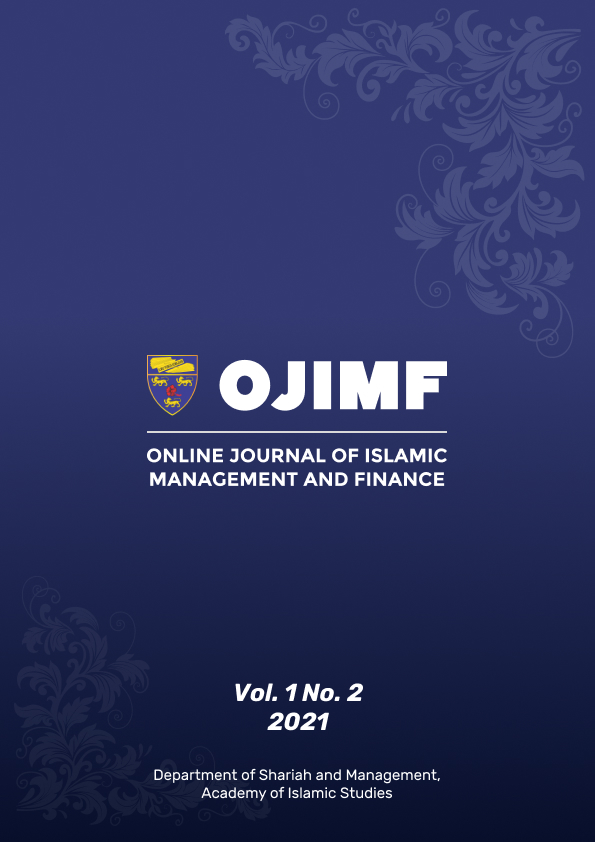INTEGRITI DALAM KALANGAN PELAJAR MUSLIM DI IPTA: SATU TINJAUAN AWAL INTEGRITY AMONG MUSLIM STUDENTS IN PUBLIC UNIVERSITIES: A PRELIMINARY REVIEW
Main Article Content
Abstract
The purpose of this preliminary review is to evaluate the effectiveness of the research instrument in identifying the level of academic and social integrity among the Muslim IPTA students in Malaysia. The quantitative study was conducted by using digital questionnaires. The study instruments were adapted from the studies of Anis Yusal (2017), Arieff Salleh Rosman et al, (2008), Nur Hafizah Yusoff (2019), Norhasilah Mat Nor (2012) and Nor Wahida (2018). Data were collected from 30 university students from various disciplines. The analysis was done by using software of IBM Statistical Package of Social Science (SPSS) version 26. The value for the Alpha Cronbach is 0.756. The analysis of data on demographic of the respondents and integrity were done using the descriptive and frequency test. For integrity, the study showed that majority of the students understand the concept of integrity. However, most of them had committed some academic integrity misconduct. As for social integrity, some agreed to several social values which are against the noble values in integrity. This contrasting finding is a concern and need to be addressed accordingly by virtue of deeper understanding on Islam as a way of life and becoming a highly integrity person. In the perspective of Islam, integrity is the value in oneself which is in line with the nature of trust, honesty, faith, strong belief, strict adherence to Islamic rules and noble manners.
Downloads
Article Details
References
Ahmad, Shah Mukhtar, (2016). Social Integrity And Consistency In Origin And Development Of Religion: A Contemporary Study. e-Proceeding of the 3rd International Conference on Arabic Studies and Islamic Civilization ICASIC2016 (e-ISBN 978-967-0792-08-8), Kuala Lumpur, Malaysia)
Amanda B. Click, (2014). Taking Something That Is Not Your Right: Egyptian Students’ Perceptions of Academic Integrity. Libri, 64(2), 109-123.
Anis Yusal Yusoff, & Zarina Mohamad Amin. 2017. Laporan hasil dapatan kajian persepsi mahasiswa mengenai rasuah di Malaysia. Institut Integriti Malaysia.
Anoopa, K. R., Manila Mathews & P. V. Greeshma, (2019). Academic Integrity among Nursing Students. International Journal of Health Sciences and Research, 9(12), 110-116.
Rosman, A. S., Hassan, A. M., Suratman, A. S., Ripin, M. N., & Marni, N. (2008). Persepsi Pelajar Universiti Teknologi Malaysia (UTM) Terhadap Plagiarisme. Sains Humanika, 48(1).
Carpenter, D. D., Harding, T. S., Finelli, C. J., & Passow, H. J. (2004). Does Academic Dishonesty Relate To Unethical Behavior In Professional Practice? An Exploratory Study. Science and Engineering Ethics, 10(2), 311-324.
Corruption Perception Index 2020. Transparency International. https://www.transparency.org/en/cpi/2020/index/nzl
Fairuz Zaidan, (2017). Remaja Tipu Sijil Sakit Didakwa, BH Online, 14 Disember 2017 – diakses pada 6 Ogos 2020.
Linda A. Kidwell & Jennifer Kent. (2008). Integrity At A Distance: A Study Of Academic Misconduct Among University Students On And Off Campus. Accounting Education: An International Journal, 17(S1), S3-S16.
Melanie Birks, John Smithson & Janene Antney, (2018). Exploring The Paradox: A Cross-Sectional Study Of Academic Dishonesty Among Australian Nursing Students. Nurse Education Today, 65, 96 – 101.
Meng Wang, (2018). Social Integrity and the Cost of Equity Capital. Open Journal of Business and Management, 7(1), 229-244.
Mohd Zuhdi Marsuki, (2009). Religious Agendas Towards Sustainable Development: An Islamic Perspective. Malaysian Journal of Science and Technology Studies, 7, 22-38.
Mohr, Thomas, Debbie Ingram, Nancy Fell & Renee Mabey, (2011). The Case For Academic Integrity In Physical Therapist Education. Journal of Physical Therapy Education, 25(2), 51-56.
Muhammad Ramzan et al., (2012). Awareness About Plagiarism Amongst University Students In Pakistan. Higher Education, 64(1).
Nasser Razek, (2014). Academic Integrity: A Saudi Student Perspective. Academy of Educational Leadership Journal, 18(1).
Nor, N. M., Hamzah, A., & Junus, N. F. (2012). Faktor-faktor Yang Mempengaruhi Gejala Ponteng Di Kalangan Pelajar Sekolah Menengah Kebangsaan Taman Selesa Jaya 2, Skudai. Journal of Educational Psychology & Counseling, 5, 12-29.
Nor Wahida Dzalihu’zzabir, & Hashim, M. R. (2018). Tahap Amalan Kerohanian Dari Aspek Akhlak Dalam Kalangan Pelajar Politeknik. IMDeC 2018, 29.
Papadakis, M. A., Hodgson, C. S., Teherani, A., & Kohatsu, N. D. (2004). Unprofessional Behavior In Medical School Is Associated With Subsequent Disciplinary Action By A State Medical Board. Academic Medicine, 79(3), 244-249.
Peikoff, Tannis, & Stephen Brickey, (1991). Creating Precious Children And Glorified Mothers: A Theoretical Assessment Of The Transformation Of Childhood. Dimensions of Childhood, 29, 630.
Siegfried, R. M. (2004). Student Attitudes On Software Piracy And Related Issues Of Computer Ethics. Ethics and Information Technology, 6(4), 215-222.
Taber, K. S. (2018). The Use of Cronbach’s Alpha When Developing and Reporting Research Instruments in Science Education. Research in Science Education, 48(6), 1273-1296.
Yunus, F. A. N., Rahim, M. B., Yasin, R. M., & Rus, R. C. (2014). Kesahan dan Kebolehpercayaan Instrumen Pemindahan Pembelajaran berdasarkan Pendekatan Model Rasch: Kajian Rintis. First Tech. Vocat. Educ. Int. Semin. (Tveis), , 1-9.
Yusoff, N. H. (2019). Integriti Akademik Dalam Kalangan Mahasiswa Universiti Kebangsaan Malaysia (UKM). Malaysian Journal of Society and Space, 15(4), 73-83.
Zainuddin Abu, Zuria Mahmud & Salleh Amat, (2008). Pendekatan Kaunseling Menangani Masalah Kebebasan Dalam Kalangan Pelajar Institut Pengajian Tinggi: Dua Kajian Kes. Jurnal Pendidikan Malaysia (Malaysian Journal of Education), 33, 107-123.
Zainudin Sharif & Norazmah Mohamad Roslan, (2011). Faktor-Faktor Yang Mempengaruhi Remaja Terlibat Dalam Masalah Sosial Di Sekolah Tunas Bakti, Sungai Lereh, Melaka. Journal of Education Psychology & Counseling, 1(Mac), 115-140
Zhengdong, J. (2002). Discussion On the Integrity and Credit of Society. Journal of Shandong Teachers' University (Social Science Edition), 3.

